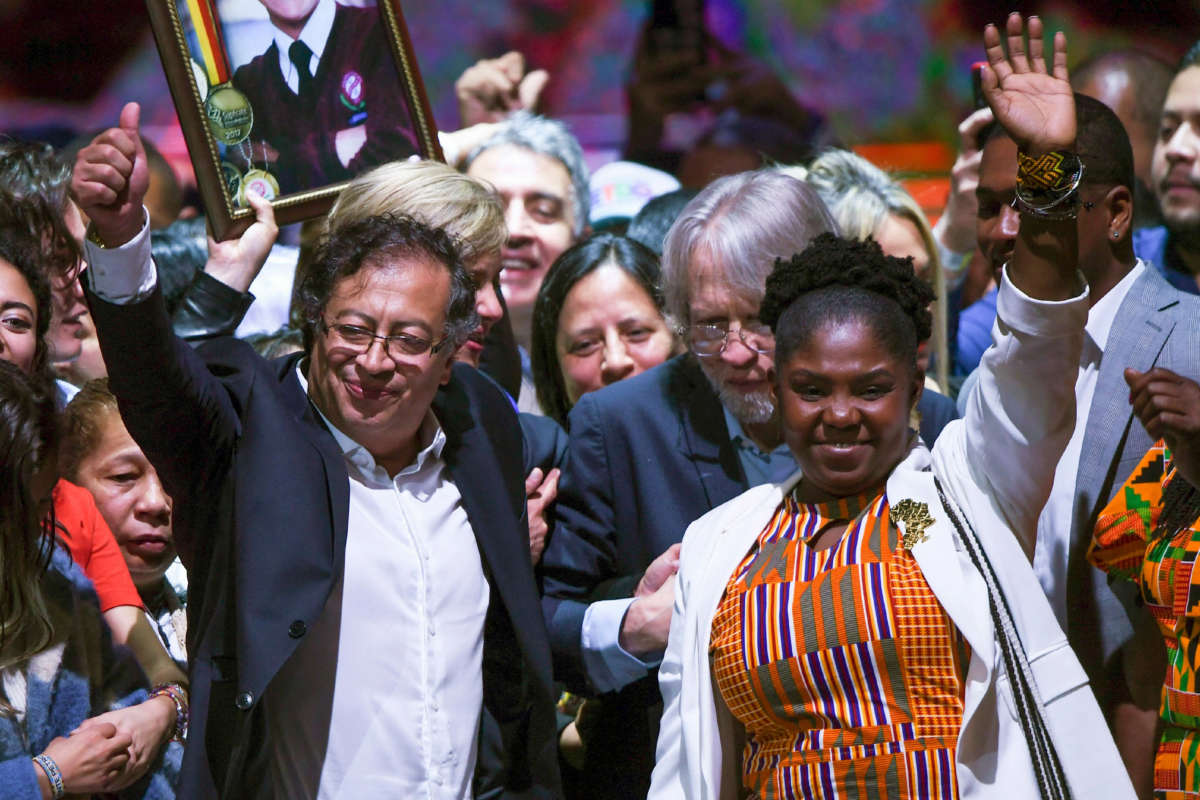Truthout is an indispensable resource for activists, movement leaders and workers everywhere. Please make this work possible with a quick donation.
Former guerrilla fighter and longtime lawmaker Gustavo Petro defeated a millionaire businessman viewed as Colombia’s Donald Trump on Sunday to become the South American nation’s first leftist president-elect, riding a wave of mass anger over inequality, poverty, and the corruption of the right-wing political establishment.
“The government of hope has arrived,” Petro, a former member of the M-19 rebel organization that disarmed in 1990 and became an influential political party, told supporters gathered in Bogotá. “This story that we are writing today is a new story for Colombia, for Latin America, for the world. We are not going to betray this electorate.”
Petro’s running mate, environmental activist Francia Márquez, will become the first Black woman to serve as Colombia’s vice president, spurring expectations that the new government will move to tackle surging deforestation in the Colombian Amazon and curb the nation’s reliance on planet-warming fossil fuels. Petro, who will take office in August, campaigned on banning all new oil projects.
“Today all women win,” Márquez said Sunday. “We are facing the greatest possibility of change in recent times.”
The leftist ticket’s historic victory in a nation long dominated by conservative elites — including current President Iván Duque — was met with enthusiastic applause throughout the region and across the globe.
Luiz Inácio Lula da Silva, the former Brazilian president who is favored to retake the post in October, said Petro’s win “strengthens democracy and progressive forces in Latin America.”
Peru’s leftist President Pedro Castillo hailed Sunday’s results as a “historic democratic victory” for Colombia and said that “we are united by a common feeling that seeks collective, social, and regional integration improvements for our peoples.”
“Brother Gustavo,” he added, “always count on the support of Peru.”
Former U.K. Labour Party leader Jeremy Corbyn joined the chorus of applause. “Incredible news from Colombia,” he wrote on Twitter, “with the election of a socialist president who has shown the power of community organizing to build a popular policy platform to heal the divisions of the past and bring about social justice.”
“Ya no es el momento de los odios, es un gobierno de la vida” @petrogustavo pic.twitter.com/nshEgWx1i6
— Claudia Calao🌳👟 (@Cloquis) June 20, 2022
Petro’s victory comes on the heels of widespread protests across Colombia in 2021, demonstrations sparked by a tax proposal from the Duque government that would have disproportionately hit the poor. An estimated 39% of Colombians lived on less than $89 a month last year.
Protests over the tax plan, which Duque ultimately withdrew, quickly ballooned into broader uprisings over the country’s widespread poverty, systematic inequities, and austerity. The Colombian police — often armed with U.S.-made weaponry — responded viciously to the demonstrations, and activists were arrested en masse.
“I ask the attorney general to release our young people,” Petro said during his victory speech on Sunday, prompting a jubilant response from the crowd of supporters.
“Le solicito al fiscal general que deje en libertad a nuestros jóvenes y a la señora procuradora que restituya a los alcaldes”, dice @petrogustavo sobre las capturas a jóvenes de primera línea y la destitución de @QuinteroCalle.
Así responde el público: pic.twitter.com/dQr7Acj6vT
— La Silla Vacía (@lasillavacia) June 20, 2022
In addition to vowing to democratize land ownership and combat poverty that has plagued Colombia for decades, the president-elect has pledged to end the nation’s war on drugs, which it has waged alongside the U.S. for years to disastrous effect. Petro also campaigned on making Colombia’s public universities free and accessible to all.
Henry Perdomo, a 60-year-old manufacturing worker, told the Washington Post shortly after he cast his vote for Petro on Sunday that “we’ve been subjected to the right and the extreme right for more than 200 years… and things here are bad, bad, bad.”
“We need a change,” he added.
A terrifying moment. We appeal for your support.
In the last weeks, we have witnessed an authoritarian assault on communities in Minnesota and across the nation.
The need for truthful, grassroots reporting is urgent at this cataclysmic historical moment. Yet, Trump-aligned billionaires and other allies have taken over many legacy media outlets — the culmination of a decades-long campaign to place control of the narrative into the hands of the political right.
We refuse to let Trump’s blatant propaganda machine go unchecked. Untethered to corporate ownership or advertisers, Truthout remains fearless in our reporting and our determination to use journalism as a tool for justice.
But we need your help just to fund our basic expenses. Over 80 percent of Truthout’s funding comes from small individual donations from our community of readers, and over a third of our total budget is supported by recurring monthly donors.
Truthout has launched a fundraiser to add 500 new monthly donors in the next 9 days. Whether you can make a small monthly donation or a larger one-time gift, Truthout only works with your support.
